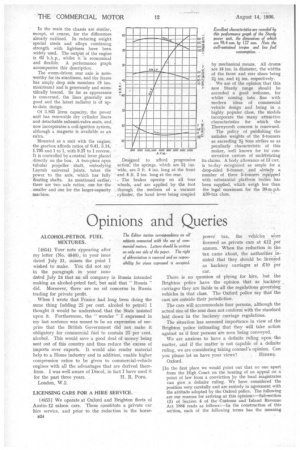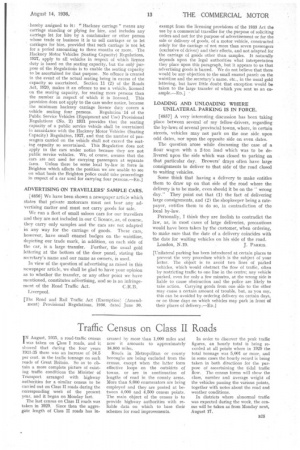Opinions and ueries
Page 30

Page 31

If you've noticed an error in this article please click here to report it so we can fix it.
The Editor invites correspondence on all subjects connected with the use of commercial motors. Letters should be written on only one side of the paper. The right of abbreviation is reserved and no responsibility for views expressed is accepted.
ALCOHOL-PETROL FUEL MIXTURES.
[4854] Your note appearing after my letter (No. 4846), in your issue dated July 31, misses the point I wished to make. You did not say in the paragraph in your issue dated July 24 that an oil company in Russia intended making an alcohol-petrol fuel, but said that " Russia " did. Moreover, there are no oil concerns in Russia trading for private profit.
When I wrote that France had long been doing the same thing [adding 25 per cent. alcohol to petrol] I thought it would be understood that the State insisted' upon it. Furthermore, the" wonder" I expressed in my last sentence was meant to be an expression of surprise that the British Government did not make it obligatory for commercial fuel to contain 25 per cent. alcohol. This would save a good deal of money being • sent out of this country and thus reduce the excess of imports over exports. It would also render material help to a Home industry and in addition, enable higher compression ratios to be given to. commercial-vehicle engines with all the advantages that are derived therefrom. I was well aware of Discol, in fact I have used it
for the past three years. H. R. POPE. London, W.2.
LICENSING CARS FOR A HIRE SERVICE.
148551 We operate at Oxford and Brighton fleets of Austin-12 saloon cars. These constitute a private car hire service, and prior to the reduction in the horse/324 of the front and rear shoes being 21 ins, and 4 ins, respectively. . We are of the opinion that this power tax, the vehicles ..1.v:ere licensed as private cars at £.12 per annum. When the reduction in the tax came about, the authorities insisted that they should be licensed as hackney carriages at 210 per car.
There is no question of plying for hire, but the Brighton police have the opinion that as hackney _ carriages they are liable to all the regulations governing vehicles in that class. The Oxford police say that the cars are outside their jurisdiction.
The cars will accommodate four persons, although the actual size of the seat does not conforin with the standard laid down in the hackney carriage regulations.
The situation has assumed importance in view of the Brighton police intimating that they will take action against us if four persons are seen being conveyed. We are anxious to have a definite ruling upon the matter, and if the matter is not capable of a definite ruling, we are considering taking counsel's oPinion. Can
you please let us have your views? . HIRERS.
Oxford.
[In the first place we would point out that no one apart from the High Court on the hearing of an appeal on a point of law from a conviction by the local magistrates can give a definite ruling. We have •considered the position very carefully and are entirely in agreement with the attitude adopted by the Oxford police. The following are our reasons for arriving at this opinion:—Sub-seCtion (3) of Section 4 of the Customs and Inland Revenue Act 1884. reads as follows :---In the construction of this section, each of the following terms has the meaning
hereby assigned to it: "Hackney carriage" means any carriage standing or plying for hire, and includes any carriage let for hire by a coachmaker or other person
• whose trade or business it is to sell carriages or to let carriages for hire, provided that such carriage is not let for a period amounting to three months or more. The Hackney Motor Vehicles (Seating Capacity) Regulations, 3927, apply to all vehicles in respect of which licence duty is based on the seating capacity, but the on13 purpose of the Regulations is to enable the seating capacity to be ascertained for that purpose. No offence is created in the event of the actual seating being in excess of the capacity so ascertained. Section 11 (2) of the Roads Act, 1920, makes it an offence to use a vehicle, licensed on the seating capacity, for seating more persons than the number in respect of which it is licensed. This provision does not apply to the cars under notice, because the minimum hackney carriage licence duty covers a
vehicle seating four persons. Regulation • 14 of the Public Service Vehicles (Equipment and Use) Provisional Regulations (No. 2) 1931 provides that the seating capacity of a public service vehicle shall be ascertained in accordance with the Hackney Motor Vehicles (Seating Capacity) Regulation, 1927, and that the number of passengers carried on the vehicle shall not exceed the seating capacity so ascertained. This Regulation does not apply to the cars under notice because they are not public service vehicles. We, of course, assume that the. cars are not used for carrying passengers at separate fares. Unless there be some local by-law in force in Brighton which affects the position we are unable to see on what basis the Brighton police could take proceedings in respect of a car used for carrying four persons.—En.]
ADVERTISING ON TRAVELLERS' SAMPLE CARS.
[4856] We have been shown a newspaper article which states that private motorcars must not bear any advertising matter and must not carry goods for sale.
We run a fleet of small saloon cars for our travellers and they are not included in our C licence, as, of course, they carry only samples and the cars are not adapted in any way for the carriage of goods. These cars, however, have small enamel badges on the waistline, depicting our trade mark, in addition, on each side of the car, is a large transfer. Further, the usual gold lettering at the bottom of the door panel, stating the secretary's name and our name as owners, is used.
In view of the question of advertising as raised in this newspaper article, we shall be glad to have your opinion as to whether the transfer, or any other point we have mentioned, constitutes adiTertising, and so is an infringe
ment of the Road Traffic Act. C.R.B. Liverpool.
[The Road and Rail Traffic Act (Exemption) (Amendment) Provisional Regulations, 1936, dated June 30, exempt from the licensing provisions of the 1933 Act the use by a commercial traveller for the purpose of soliciting orders and not for the purpose of advertisement or for the sale or delivery of goods, of a motor vehicle, constructed solely for the carriage of not more than seven passengers (exclusive of driver) and their effects, and not adapted for the carriage of goods other than samples. It naturally depends upon the legal authorities what interpretation they place upon this paragraph, but it appears to us that advertising goods is barred. We do not believe that there would be any objection to the small enamel paneie on the waistline and the secretary's name, etc., in the usual gold lettering, but have little doubt that exception would be taken to the large transfer of which you sent us an example.—En.]
LOADING AND UNLOADING WHERE UNILATERAL PARKING IS IN FORCE.
[4857] A very interesting discussion has been taking place between several of my fellow-drivers, regarding the by-laws of several provincial towns, where, in certain streets, vehicles may not park on the one side upon odd dates, nor upon the opposite side on even dates.
The question arose while discussing the case of a flotir ikagon with a 2-ton load which was to be delivered upon the side which was closed to parking on that particular day. Brewers' drays often have large consignments to deliver to that side of the road closed to waiting vehicles.
Some think that having a delivery to make entitles them to draw up on that side of the road wherethe delivery is to be made, even should it be on the " wrong day." They point out that (1) the fact of delivering large consignments, and (2) the shopkeeper being a ratepayer, entitles them to do so, in contradiction of the local by-law.
Personally, I think they are foolish to contradict the law, as, in most cases of large deliveries, precautions would have been taken by the customer, when ordering, to make sure that the date of a delivery coincides with the date for waiting vehicles on his side of the road.
London, N.19. 3. PARRIS.
[Unilateral parking has been introduced at certain places to prevent the very procedure which is the subject of your letter. The object is to avoid two lines of parked vehicles, which would obstruct the flow of traffic, often by restricting traffic to one line in the centre; any vehicle parked, even for only a few minutes, at the wrong side is liable to cause obstruction and the police are likely to take action. Carrying goods from one side to the other may cause a certain amount of trouble, but, as you say, this can be avoided by ordering delivery on certain days, or on those days on which vehicles may park in front of their places of delivery.—Enj












































































